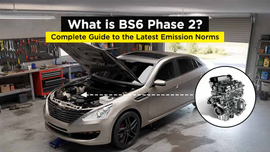From Engine to Tyres: A Step-by-Step Truck Maintenance Guide

Regular inspection and servicing come under truck maintenance, and it ensures efficient and safe truck operations. It includes regular checks on fluids, brakes, tyres, and electrical systems. In this article, we will discuss the key elements to look for in truck maintenance during different seasons. BS6 trucks need extra care and professional care tips for them will be discussed in the article.
Table of Contents
- What is Truck Maintenance?
- Why is Truck Maintenance Important?
- Step by Step Truck Maintenance Guide
- Understanding Seasonal Truck Maintenance
- Preventive Truck Maintenance Schedule
- Maintenance Tips for BS6 Engines
- Common Truck Maintenance Mistakes to Avoid
- Conclusion
What is Truck Maintenance?
Properly maintained and serviced truck fleet is an important factor for a successful transport business. Timely maintenance of trucks increases their on-road performance, makes them safe, and also reduces operating costs. Trucks that perform efficiently help save on fuel costs and avoid unwanted delays.
Repairing issues and breakdowns that may arise in the future can easily be identified with timely maintenance and resolved earlier. Every small component, from the engine oil to the tyre pressure, plays an important role in keeping a truck running smoothly. With proper truck maintenance planning, truck owners can extend the lifespan of the trucks.
Why is Truck Maintenance Important?
Regular truck maintenance goes beyond periodic servicing as it directly affects the truck’s performance and safety.
Financial Advantages
Engine damage and early issues in transmission parts can be easily avoided with regular maintenance. A simple task like timely changing engine oil can save money over time by lowering chances of truck breakdowns.
Operational Efficiency
A properly maintained and serviced truck experiences reduced breakdowns. The truck stays operational for longer time, and drivers encounter fewer roadside issues.
Safety and Compliance
Issues like faulty brakes, worn tyres, or fuel leaks that pose serious risks can be easily detected and avoided with regular maintenance. Also, certain safety standards like pollution and fitness certificates are necessary to be kept in check. These certificates require regular inspections that help identify any kind of mechanical and emission issues, ensuring proactive repairs.
Step by Step Truck Maintenance Guide
Engine and Transmission Care
The engine and transmission are the most important part of a truck, and the following checks must be done during maintenance:
- Change engine oil as per OEM and use advised oil grade to reduce wear and tear of moving parts in the engine.
- Clean clogged air filters for optimal combustion and power output.
- Check the coolant levels at regular intervals to save the engine from seizing.
- Examine cracked or loosened belts and leaks in hoses as they may result in sudden breakdowns.
- Watch out for transmission problems, like difficulty in shifting gears or delayed response, and vibrations when engaging the clutch. Consult a professional technician about such issues.
Brake System and Safety Checks
- Regularly check the brake pads and replace if needed. Also, inspect the rotors and drums before they start affecting brake efficiency.
- Check brake fluid levels and pressure to avoid compromising the braking system.
Tyres and Alignment
- Keep tyres properly inflated to increase their lifespan. Maintain properly inflated tyres to improve mileage and increase their usage time.
- Rotate tyres every 8,000–10,000 kilometres to ensure even tread wear.
- Periodic wheel alignment and balancing should be done to avoid uneven tire wear and strain on the suspension system.
- Check tread depth and sidewalls regularly to prevent skidding or blowouts.
Maintenance Tips for BS6 Engines
Check the exhaust system and DPF (Diesel Particulate Filter) for soot buildup. Make sure it gets cleaned or regenerated (active/passive) as needed because BS6 Phase 2 trucks rely heavily on DPF efficiency.
Always maintain proper AdBlue levels because low AdBlue levels can trigger engine derate mode and warning lights.
Understanding Seasonal Truck Maintenance
Different climates create unique challenges for trucks, and seasonal maintenance can help keep the trucks up and running no matter what the conditions are. Below, we have discussed maintenance tips based on different seasons:
Truck Maintenance in Winter
Cold temperatures can severely affect a truck’s performance, so it becomes important to follow these steps:
- Test the battery and charging system since cold weather reduces battery capacity.
- Use winter-grade oil to ensure the antifreeze concentration is adequate.
- Check heating systems to maintain cabin comfort for drivers.
- Carry tyre chains if the truck operates in snowy or icy areas.
- Inspect wipers and defrosters for clear visibility.
- Use a cold-weather-specific brake fluid to ensure it functions properly.
- Preheat engine to prevent engine damage.
- Check fuel systems to prevent fuel gelling.
Truck Maintenance in Summer
Overheating and fluid loss are some common issues in hot weather, and proper truck maintenance is needed to avoid such issues.
- Check coolant and oil levels closely and also inspect all the radiator and hoses for leaks and cracks.
- Check the air conditioning system to keep long drives comfortable.
- Check tyre pressure regularly, as heat can cause expansion and lead to blowouts.
Truck Maintenance in Monsoon
Rainfall can increase the risk of damage to electrical and mechanical parts.
- Check windshield wipers and washer systems to maintain clear visibility.
- Check the tyres for sufficient tread depth as it provides good traction on wet roads.
- Inspect the body and cargo areas for water leakage.
- Load cover should be available to protect the load in rain.
- Keep electrical connections dry and protect them from rainfall.
- Apply rust protection paint and check all light points are working perfectly.
Preventive Truck Maintenance Schedule
Preventive maintenance focuses on routine inspections and services because they help resolve minor issues before they become major. By following a consistent schedule as discussed below, minor issues can be identified and fixed early.
Daily Checks
- Inspect tyres, lights, mirrors, and windshields.
- Check oil, coolant, and brake fluid levels, and refill them if needed.
- Listen to unusual engine noises during start-up.
- Tyre tread depth and pressure should be maintained.
- Check the air system of the air brakes to brake failure.
Weekly Checks
- Check the battery voltage and connections to prevent electrical malfunctioning.
- Clean air and fuel filters to prevent clogging.
Monthly Checks
- In-depth brake inspection.
- Belts, hoses, and hydraulic system should be tested.
- Rotate tyres and adjust alignment if needed.
- Examine the exhaust and emission control systems.
- Check DPF and AdBlue levels and refill if necessary.
- Safety gear, fire extinguishers, etc., should be in place.
Quarterly and Annual Checks
- Run full engine diagnostics to evaluate performance.
- Check suspension, steering, and gearbox systems.
- Perform radiator flushing and replace old fluids.
- Inspect frames and chassis for rust or damage.
Common Truck Maintenance Mistakes to Avoid
- Ignoring minor oil leaks and engine noises.
- Skipping periodic tire change and alignment checks.
- Choosing cheap, non-certified parts or low-quality lubricants.
- Loading trucks beyond capacity.
Attending such details helps keep the truck in working conditions with low fuel consumption and not so frequent breakdowns.
Conclusion
Truck maintenance is important as it increases the operational efficiency of trucks. Strategic and well-planned maintenance helps to reduce truck problems frequency. It also keeps the driver safe when he drives a well-maintained truck with a proper engine and braking system. Digital monitoring allows for smoother and more reliable trucking operations. Truck maintenance has also become better with the introduction of telematics and mobile applications.
Proper truck maintenance by following a preventive schedule and recording service details can keep the trucks running for longer times. Modern tools also help to predict potential issues so they can be solved earlier and keep the trucks ready for any journey ahead.
Frequently Asked Questions On Step-by-Step Truck Maintenance Guide
1. What regular maintenance should be done on a truck?
Regular truck maintenance includes checking and changing oil and filters, inspecting tyres, checking fluid levels, and a thorough brake system inspection.
2. What is truck maintenance?
Truck maintenance is the process of inspecting, cleaning, repairing, and replacing parts to ensure a truck functions properly and has a long lifespan.
3. What is the maintenance cost of a truck?
The annual maintenance cost for a truck in India can range between Rs 50,000 and Rs 1,50,000. The cost also depends on usage and model.
4. How do I run basic maintenance on my truck?
To perform basic truck maintenance, check and maintain fluids like engine oil and coolant, inspect tyres, and routinely check and replace filters.
5. What is preventive maintenance on a truck?
Preventive maintenance for a truck involves scheduled, routine inspections and servicing to prevent potential issues before they cause a breakdown.


Related Blogs












